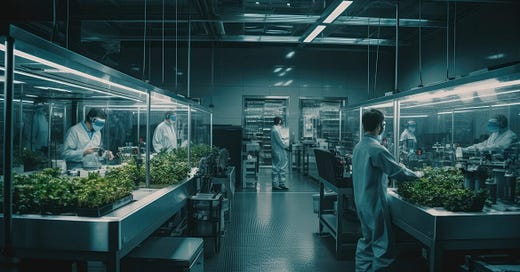Navigating the Modern Food Landscape with Biblical Wisdom
Making informed eating choices in a world of toxic options.
Christians find liberation in Christ’s teachings, emancipating them from the stringent, legalistic dietary codes of Judaism. Jesus implored followers not to fret over food and drink (Matthew 6:25; Luke 12:22), emphasizing that true defilement does not stem from what enters the body (Mark 7:15). However, contemporary Christians navigate a distinct era, one marked by a cautionary awareness of a new age of potentially harmful food that challenges the sufficiency of God’s provision.
In the Genesis narrative, God explicitly outlines the toil required for earning sustenance, reprimanding Adam for partaking in forbidden fruit:
“Cursed is the ground because of you; in pain you shall eat of it all the days of your life; thorns and thistles it shall bring forth for you; and you shall eat the plants of the field. By the sweat of your face you shall eat bread, till you return to the ground,” Genesis 3:17-19, ESV.
Isaiah warns against the worship of idols crafted by human hands (Isaiah 2:8), while Revelation foretells the Black Horse of Famine (Revelation 6:5-6). Modern industrial agriculture presents a perilous pact of dependency and concealed toxins, prompting more Christians to recognize the spiritual dimensions of this nutritional challenge.
Unlike the pastoral world of Christ, deeply tied to farming and the soil, contemporary Americans often distance themselves from this connection. The result is a potentially perilous dependency, contrary to godly principles.
Instead of tilling the soil through thorns and sweat, modern society often opts for drive-through food services or fills grocery carts in national chain stores. Cultivating food awareness becomes a means of breaking free from dependency and promoting overall health. God’s provision of wholesome food serves as an antidote to the various health challenges afflicting this generation, including obesity, cancer, sterility, mental health issues, and the broader impacts of a food system gone astray.
“Forever chemicals” such as PFAS, which do not break down and accumulate in the human body, contaminate food and drinking water. Packaging introduces additional chemicals like BPA, phthalates, and endocrine disruptors that mimic estrogen, posing reproductive and gender function risks. Vulnerability to these health hazards is heightened in children and pregnant women.
Research indicates that “fast” food often ranks as the most toxic and least healthy option. While not everyone can afford organic alternatives, adhering to general guidelines becomes crucial. The Environmental Working Group’s annual “Dirty Dozen” lists produce most likely to be tainted with pesticides, recommending organic choices when possible. Conversely, the “Clean Fifteen” comprises fruits and vegetables with natural peels or shells, offering relatively safer options.
Navigating the confusing landscape of healthy choices requires discernment, especially given the deceptive practices of the food industry. Basic guidelines provide a starting point for informed Christian food choices, including avoiding high fructose corn syrup, hydrogenated fats, and other obviously unhealthy pseudo-food products. Achieving complete purity in dietary habits may be challenging in today’s world, much like the pursuit of absolute sinlessness, but minimizing exposure to toxins aligns with a healthier lifestyle. God desires healthy temples for His followers; therefore, moderation in all things remains a biblical principle (1 Corinthians 6:12; 9:25).
(Previously published at Christian News Journal.)






Thanks John for highlighting this important biblical connection between food and scripture. Jesus did not say to not worry about what you eat or drink so go ahead and eat poison (read highly processed) junk food. Encouraging and incentivizing people to eat mass junk food was thoroughly baked into the covid scam. The traffic at all fast food drive up windows increased 10 fold early on in the scam and continues on now.
The hardest thing for people today to understand is that every choice, especially food, is a moral choice.
https://fatrabbitiron.substack.com/p/secede-and-or-every-choice-is-a-moral